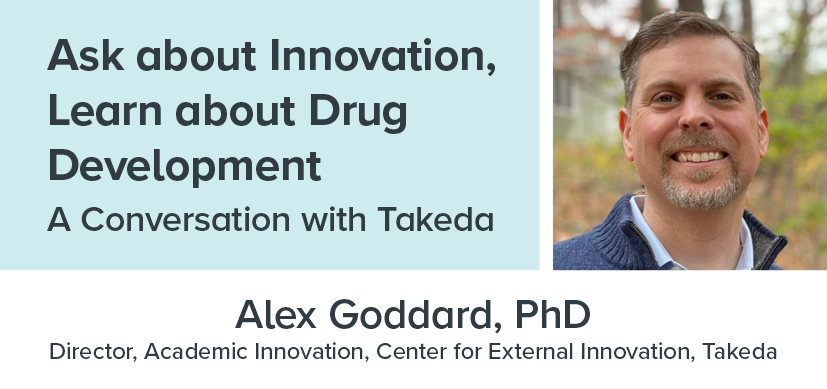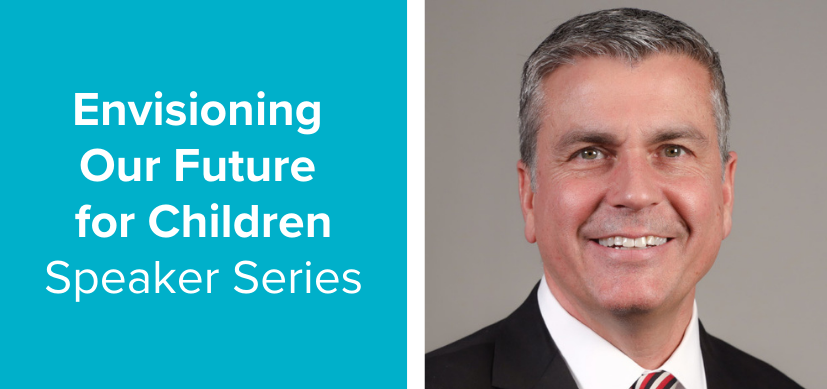Ask about Innovation, Learn about Drug Development: A Conversation with Takeda
Post Date: September 29, 2021 | Publish Date:

From concept through preclinical testing in the laboratory, to clinical trial development and execution, the typical journey to an approved vaccine or drug is understandably long and expensive. The strategy of in-licensing technologies from academic institutions is attractive to the biopharma industry because it expedites development and mitigates the investment risk.
For academic researchers who may be unfamiliar with commercialization, an upcoming virtual event has been designed to educate about innovation and partnering with industry.
On Wednesday, Oct. 27, 2021 at 9:30 am ET, Cincinnati Children’s Innovation Ventures (CCIV) will host a livestream event, titled Ask about Innovation, Learn about Drug Development.
This one-hour virtual conversation between CCIV and Takeda will spotlight the similarities and differences in preclinical research in academic and biopharma and will also dispel some myths about working with industry to commercialize technology.

Russ Wyborski, PhD, who accelerates small molecule discoveries by Cincinnati Children’s investigators on behalf of CCIV, will give an overview of the drug development process. Wyborski is a veteran of industry R&D and biotech investment and will offer a macro view of drug development. In particular, he will discuss various exit points for translational research.
Alex Goddard, PhD, Director of Academic Innovation for Takeda, will speak about the exit points from the industry perspective. Goddard will elaborate on Takeda’s in-licensing areas of interest, as well as the type of experiments most attractive to the Takeda and Cincinnati Children’s Research Alliance.

WHAT DO YOU HOPE THAT AUDIENCE MEMBERS WILL LEARN FROM YOUR CONVERSATION?
Goddard: External collaboration is critical to Takeda’s R&D strategy, and we are committed to unlocking innovative science no matter where it resides. Thus, we have dedicated efforts to source innovation from academic centers of excellence, such as Cincinnati Children’s. We have a goal of having 25% of our pipeline derived from collaborative activity with Academia.
Wyborski: Cincinnati Children’s researchers are experts in their fields of study. Over the past 100 years, the pharmaceutical industry scientists are highly skilled experts in the job of developing a small molecule or biologic into a drug candidate. The overlap of professional expertise can be used in a complementary fashion to accelerate new drugs. Collaborations with companies like Takeda provides researchers with novel insights that can be applied to their basic research, too.
WHAT DO YOU KNOW NOW ABOUT PARTNERING WITH INDUSTRY/ACADEMIA THAT YOU WISHED YOU LEARNED EARLIER IN YOUR CAREERS?
Goddard: I hope to convey that early decisions can have big implications for the outcome of your program, for better or for worse. At Takeda, we often start our programs with the end in mind. We seek to develop transformational therapies, and as such, we need to consider how any therapeutic program stacks up against the current standard of care. We also closely consider the competitive landscape of therapies that, while not yet approved, may be the next ‘first in class’ or ‘best in class’ medicine. Early, conceptual conversations with a partner like Takeda can help provide insight into the best paths to create a new product.
Wyborski: Within any particular area of study, basic research and drug development can occur in parallel. Great talent exists on both sides. The key is recognizing the best place to carry out each piece of work.
HOW DO INDUSTRY PARTNERSHIPS ADVANCE CINCINNATI CHILDREN’S?
Wyborski: Cincinnati Children’s mission is “to improve child health and transform delivery of care through fully integrated, globally recognized research, education, and innovation.” Working together with industry increases the probability that the work being done at Cincinnati Children’s will provide the next generation of drug treatments for a wide variety of pediatric diseases.
9:30 am ET, Wednesday, Oct. 27, 2021
This event is free and open to the public. It will be livestreamed virtually, but not recorded.
Registration is required, and those who are interested in attending are encouraged to email virginia.vanhorne@cchmc.org by Monday, Oct. 25 to register.
Cincinnati Children’s investigators are encouraged to visit CenterLink to learn about eligibility for funding and laboratory research support from the Takeda and Cincinnati Children’s Research Alliance.







